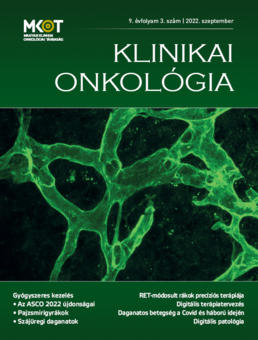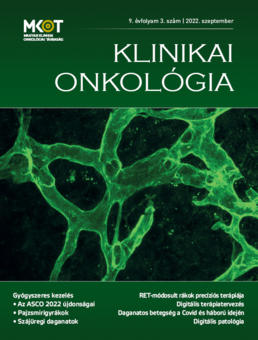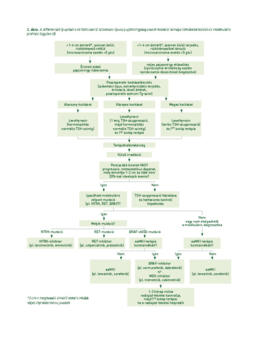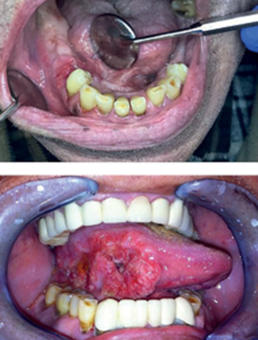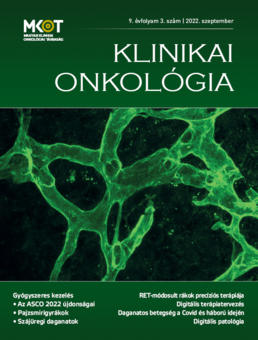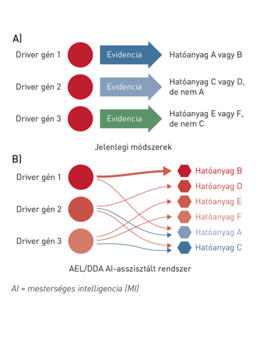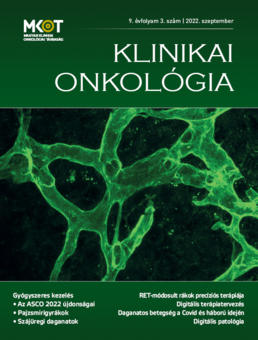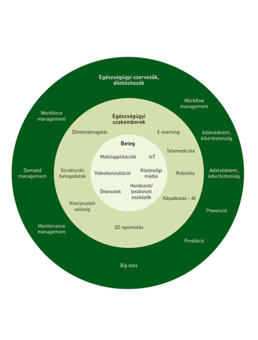The eLitMed.hu medical portal uses computer cookies for convenient operation. Detailed information can be found in the Cookie-policy.
Clinical Oncology - 2022;9(3)
Content
[Molecular diagnosis and treatment of thyroid cancer]
[Thyroid tumours are the most common malignant endocrinological diseases. The diagnostic and therapeutic approach to this group of diseases has undergone a major shift in the recent years. The classical diagnostic algorithms used in the past have been complemented by an increasingly broad spectrum of molecular diagnostic options that are becoming more readily available, allowing the treatment of choice to be more specific for the patients. As a result, in recurrent, extensive disease states, molecular-targeted therapies have now begun to supplant systemic chemotherapies from treatment guidelines and in many cases have been promoted to be used as second-line treatment. The clinical relevance and topicality of the subject is therefore clear, and in this paper we aim to provide a comprehensive overview of state-of-the-art molecular diagnostics and treatment strategies for the histological subtypes of thyroid cancer.]
[Contemporary treatment of oral cancer]
[In Hungary, the cancer of the oral cavity is one of the most common malignancies. The most important etiological factors are smoking and alcohol consumption, and to a lesser extent oral infection caused by human papilloma viruses (HPV). Although early diagnosis is relatively easy, presentation with advanced disease is not uncommon. Physical examination and imaging are essential for the diagnosis and precise determination of the stage, which predicts survival and determines further therapeutic options. In the past 30 years, improvements in diagnostics, and surgical techniques combined with the postoperative radiation or chemoradiation have resulted in improved survival, and the development of complex dento-oral care and surgical reconstruction have resulted in improved quality of life. Due to its important role in nutrition, speech training and the aesthetics of the head and neck region, the surgical treatment of oral cavity tumors and their surgical rehabilitation with good functional results require special preparation. Despite carefully planned and implemented therapy, loco-regional relapses and distant metastases can also develop. Immunotherapy (pembrolizumab, nivolumab) either as monotherapy or in combination with chemo/radiotherapy plays a decisive role in their treatment. In the future, the mapping of additional biomarkers, endogenous and microenvironmental factors may help effective, personalized treatments.]
[Artificial intelligence-assisted digital therapy planning in precision oncology]
[Precision oncology has become part of routine patient care now. A growing number of cancer patients have molecular diagnostic test results of several hundred genes. More than 100 targeted or immunotherapies are registered today. Besides the new opportunities, oncologists may also face challenges, as multiple therapy options are available for the same biomarkers and the four-five co-occurring driver mutations present on avarage in the same tumor can alter the response to targeted therapies. Tumors often harbor multiple targets and biomarkers in parallel. Molecular tumor boards (MTBs) are responsible currently for setting the optimal treatment plan. However, multiple studies showed that different MTBs frequently choose different treatments for the same cases with complex molecular profiles. Standard decision making is required, so that we can measure and improve the efficacy of the decision making method itself. This way, the efficacy of decision making methods would become comparable, so patients could be treated based on the most effective of them. The digital drug assignment (DDA) algorithm provides an opportunity to standardize treatment decisions in cases where multiple targeted or immunotherapy options are available and the guidelines do not provide information on the difference of the clinical benefit regarding these compounds. The clinical benefit and safety of this method was demonstrated by re-analysis of the data of patients treated in the SHIVA01 clinical trial.]
[Cancer in the time of Covid and war – A psychological review]
[People living with cancer have had to face many challenges in their everyday lives. However, the Covid-19 pandemic and then the Russian-Ukrainian War have brought them even more trials. The virus and the war have shaken their basic physical security and needs. In such a period, psychological support for vulnerable populations is extremely important, as anxiety and depression disorders can develop on the basis of continuous uncertainty, worry and social isolation. This psychological review article is intended to provide guidance to cancer patients or anyone who feels overwhelmed by the fear of the virus, social issues and does not know where to ask for help.]
[Pathology without borders: digital pathology – telepathology]
[Digitalization of various aspects of pathological diagnostics occurred in the past decades. It involved automatic sample processing, workflow management, sample digitalization, digital slide diagnostics, telepathology, teleconsultations and digital reporting. Using automatization the biomarker detection and evaluation became standardized. These developments have major impact in oncology. Furthermore, pathological databases are usefull for quality control, but also for epidemiological studies.]
1.
Clinical Neuroscience
[Headache registry in Szeged: Experiences regarding to migraine patients]2.
Clinical Neuroscience
[The new target population of stroke awareness campaign: Kindergarten students ]3.
Clinical Neuroscience
Is there any difference in mortality rates of atrial fibrillation detected before or after ischemic stroke?4.
Clinical Neuroscience
Factors influencing the level of stigma in Parkinson’s disease in western Turkey5.
Clinical Neuroscience
[The effects of demographic and clinical factors on the severity of poststroke aphasia]1.
2.
Clinical Oncology
[Pancreatic cancer: ESMO Clinical Practice Guideline for diagnosis, treatment and follow-up]3.
Clinical Oncology
[Pharmacovigilance landscape – Lessons from the past and opportunities for future]4.
5.
